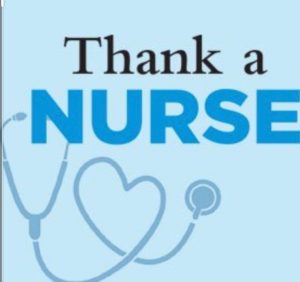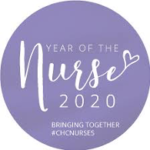 Traditionally, each year in mid-May the health care community celebrate nurses during National Nurse Appreciation Week. Coincidentally, the World Health Organization and the National Association of Community Health Centers designated 2020 as the year of the nurse. At no time in history do nurses deserve this recognition more for their hard work and dedication to the health of their communities. They are heroes and leaders on the front lines fighting a global pandemic that no one anticipated at the start of year. Now more than ever, we need to thank the nurses in our lives for all they do as the backbone of health care, working long hours caring for Covid-19 patients as well as other patients with equally challenging health issues during a time of great uncertainty.
Traditionally, each year in mid-May the health care community celebrate nurses during National Nurse Appreciation Week. Coincidentally, the World Health Organization and the National Association of Community Health Centers designated 2020 as the year of the nurse. At no time in history do nurses deserve this recognition more for their hard work and dedication to the health of their communities. They are heroes and leaders on the front lines fighting a global pandemic that no one anticipated at the start of year. Now more than ever, we need to thank the nurses in our lives for all they do as the backbone of health care, working long hours caring for Covid-19 patients as well as other patients with equally challenging health issues during a time of great uncertainty.
Kadee C. is a nurse at a small community hospital in Federal Way, WA, just outside Seattle. She has been a nurse for almost 15 years. She works in the step-down unit of her hospital caring for very sick people who have just come from the ICU or patients that do not quite need intensive care level attention but need more care than the medical unit traditionally provides. Kadee loves the diversity of her work, including her diverse patient population. She is a powerhouse, yet Kadee reveals that nursing school and her years of experience did not prepare her for a global pandemic.
In the last few months, Kadee has cared for many Covid-19 patients. These patients are typically admitted to her unit before or after spending time in intensive care. Kadee tells me how challenging it was to care for very sick people whose families and loved ones could not be present to comfort them during their hospital stay. This has changed her perspective and she sees their world differently than she had in the past. They are alone, scared, and made more frightened by watching TV all day- the endless stream of scary, over sensationalized news. The nursing staff, like many other industries, has become creative using technology: streaming visits with patients and their families as well as streaming doctors’ visits and communicating medical plans to families. Kadee says that her team has learned to rely on Zoom if they need a consult on a Covid-19 patient with the ICU nurses, should the severity of their illness increase. Unfortunately, even with these added efforts, tension often arises between medical teams and families as the frustration of being apart and uncertainty grows.
I asked Kadee what has been most frightening for her as a provider during this pandemic? “Uncertainty” she says, a common feeling amongst many of us these days. There was quite a bit of fear in the early days of the pandemic in her hospital as precautions for hospital staff changed frequently. She questioned if she was being kept safe from infection while doing her job and was fearful for her family. She is a mother of three children, and she asked herself every day if she was keeping her family safe by going to work. She adapted her routine, keeping her work clothes at the hospital, showering immediately once home and not wearing shoes in her home. Some of the nurses she works with have stayed separate from their families in order to afford them extra protection from infection. Kadee has comforted her family and quelled their fears by open, honest, and fact-based family communication. Her oldest daughter is about to begin college and has been so inspired by her mother’s commitment and sacrifices that she is planning to also study nursing.
Kadee also describes the challenges of caring for patients teetering on the edge of needing intubation. These patients represented a higher acuity, requiring more care than her unit traditionally was accustomed to. Many of her patients are non-English speaking, creating a further challenge in translating medical information in this “new normal” of virtual communication.
Thankfully hospital precautions have stayed consistent over the last month which has improved morale and made the nurses feel more secure. All hospital patients are getting tested, and none of Kadee’s fellow nurses have become sick with Covid-19, further creating peace of mind for the staff. Kadee’s small hospital was hit hard early on and had many more Covid-19 cases compared to their neighboring facilities. This number is steadily decreasing and Kadee is able to take a step back and reflect. She says through all the stress, the community has stepped up and been there for the hospital staff – making them feel appreciated. Some patients with extended stays have recovered and will be released to go home. Her hospital plays “Here Comes the Sun” by the Beatles when patients are released, and it feels like a celebration. Her unit has also grown as a team, supporting one another more fully. Kadee says their leadership team has been more present in meaningful ways, such as reducing nurse to patient ratios.
As we approach the next phase of this pandemic, Kadee expresses concern about the financial health of her hospital. Many people have avoided seeking care due to fear. This has led to cutbacks in staffing, furloughed nurses, and negative impacts on the financials health of her hospital as well as health care providers nationwide. Furthermore, she is concerned that very sick people have delayed seeking care out of fear. Many have waited too long and are now much sicker than if had they sought care earlier. These are very real concerns affecting much of our nation as we look to redefine both the provision and business side of health care, creating more uncertainty as we navigate re-opening our communities.
Nurses are our world’s life savers. They deserve appreciation and thanks, not just for a week in May but every day for all they do to protect the health of their communities. Thank you Kadee, and all the nurses for taking good care of your patients during this very challenging and scary time. With gratitude and good health – Cindy

